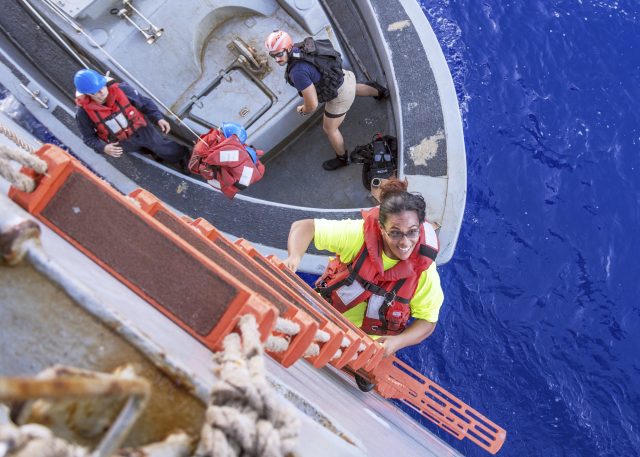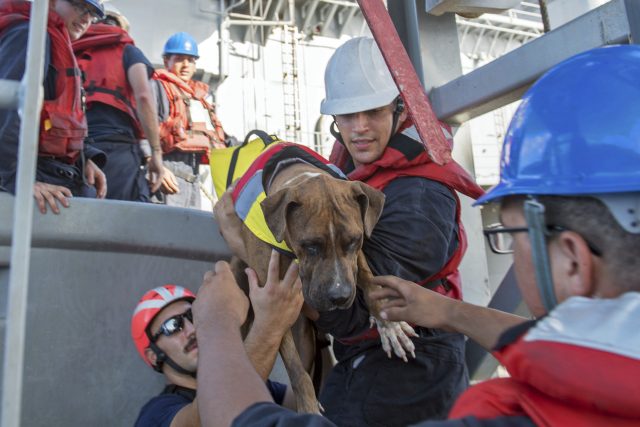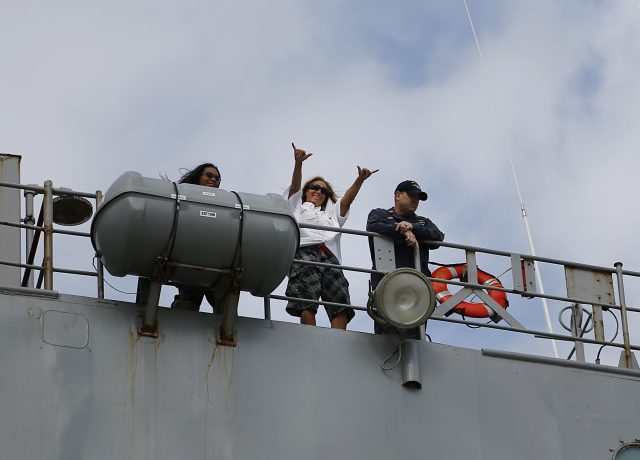Two women who were rescued after being lost at sea have defended their account of the ordeal, insisting that a storm was whipping up 30ft waves and near hurricane-force winds on the night they set sail.
Jennifer Appel and Tasha Fuiava spoke out after records suggested no severe weather in the area at the time.
The US Coast Guard is reviewing records from the days after they put to sea from Hawaii in a 50ft yacht, but Nasa satellite images for the days around their departure show no organised storms in the region where they planned to travel.
????????: #USSAshland rescues two mariners and their dogs stranded in Pacific Ocean for months – https://t.co/u4ntPRLtHL via @Amphib7FLT pic.twitter.com/t7e50EwTjt
— U.S. Navy (@USNavy) October 26, 2017
There was a tropical cyclone, but it was near Fiji, thousands of miles west of Hawaii.
Localised squalls are known to pop up, but a storm lasting three days would have been visible on satellite and would have elicited mass warnings to the public to brace for the weather.
“We got into a Force 11 storm, and it lasted for two nights and three days,” Ms Appel said.
Coast Guard officials on Monday said that the two women had an emergency beacon but never turned it on because they did not fear for their lives. If they had, rescue would have been headed their way in a matter of minutes.

The women “stated they never felt like they were truly in distress, like in a 24-hour period they were going to die”, said Coast Guard spokeswoman Petty Officer 2nd Class Tara Molle.
They said they did not use the beacon because they never felt they were in immediate danger, yet they have been quoted as saying they did not think they would survive another day, and that they were fearful during a dramatic tiger shark attack that lasted for six hours.
The pair said they had been flagging vessels and sending distress signals for at least 98 days.

“We knew we weren’t going to make it,” Ms Appel said. “So that’s when we started making distress calls.”
The Coast Guard outlined other inconsistencies, most notably on the timing of events.
Ms Appel’s mother Joyce told the AP that she called the Coast Guard to report her daughter missing a week and a half after they departed for what they believed would be an 18-day trip to Tahiti.
????: Back on dry land, Jennifer Appel – one of two mariners rescued by #USSAshland – reacts to her rescue – https://t.co/u4ntPRLtHL pic.twitter.com/vHqzouJHOT
— U.S. Navy (@USNavy) October 30, 2017
However, the Coast Guard never got a call from Joyce Appel. They received a call from a “family friend” they identified as a male on May 19, several days before the women expected to arrive.
The women said they filed a float plan listing their course and other details with friends and relatives. However, in an interview with the Coast Guard, the women said they had filed no float plan.
They also defended their claims that their boat would not fit into harbours on some Hawaiian islands, places where much larger vessels come and go regularly.

Their description of 20ft to 30ft tiger sharks ramming their boat in a co-ordinated attack for more than six hours could simply be misperception, but scientists who study sharks say that behaviour has never been recorded and that tiger sharks grow to only about 17ft in length.
University of Hawaii professor and veteran shark researcher Kim Holland has never heard of any kind of shark repeatedly attacking a boat hull throughout a night. He also said tiger sharks never jump out of the water and do not make co-ordinated attacks.
New details have emerged in the women’s account, and other details have changed. They have now reported making contact with someone at Wake Island but previously said no one responded to their calls for help.
Their account of receiving a tow from a Taiwanese fishing vessel changed as well. They originally said the crew was kind, but later said they were worried for their safety and thought that the crew might be making an attempt to harm them.






